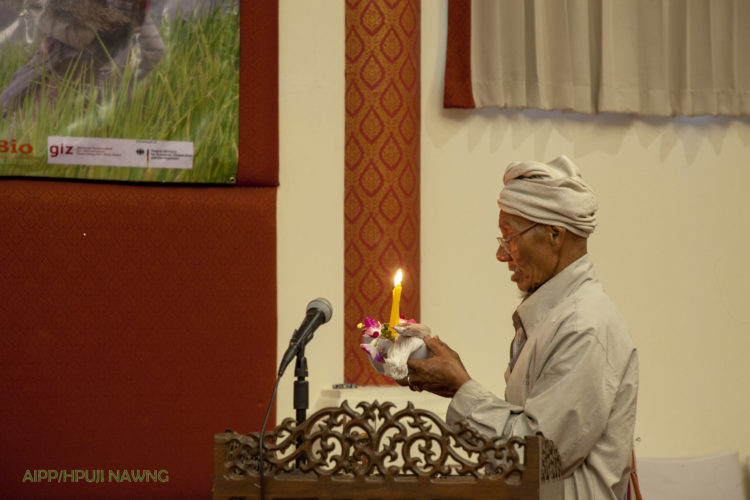 Story highlights
Story highlights
- SwedBio co-convened a workshop from 18-20 February 2020 in Chiang Mai, Thailand that evaluated at how human rights should be incorporated into the Convention on Biological Diversity’s (CBD) the post-2020 Global Biodiversity Framework.
- One day of the workshop was dedicated to visiting two Karen communities, Hin Lad Nai and Doi Chang Pa Pae to ensure that workshop content was connecting local relevance to the global level.
- A statement from the workshop was delivered at Convention on Biological Diversity's second working group meeting the by one workshop participant Polina Shulbaeva, representing International Indigenous Forum on Biodiversity.
A workshop hosted by SwedBio partners in Thailand highlights the importance of acknowledging the connection between human rights and biodiversity within the post-2020 Global Biodiversity Framework.
Human rights depend on thriving, biodiverse ecosystems. The rights to food, clean water, clean air, health, culture and life itself are irrefutably linked to functioning ecological processes. Despite this, environmental defenders are targeted for guarding nature and their communities’ territories against environmentally harmful industries, such as mining, monoculture plantations, and mega-infrastructure.
These insights are important for the Convention on Biological Diversity’s (CBD) new strategy – the post-2020 Global Biodiversity Framework.
For years, SwedBio has been collaborating with a group of partners on the links between biodiversity and human rights agendas. From 18-20 February 2020, SwedBio co-convened another workshop, Thematic Workshop on Human Rights as enabling condition in the post-2020 Global Biodiversity Framework, in Chiang Mai, Thailand. The objective was to generate constructive and concrete input for the initial zero-draft for the post-2020 Global Biodiversity Framework.
In addition to SwedBio, the workshop was co-convened with Asia Indigenous Peoples Pact (AIPP), Forest Peoples Programme, Deutsche Gesellschaft für Internationale Zusammenarbeit GmbH on behalf of the German Federal Ministry for Economic Cooperation and Development, International Development and Law Organization, Natural Justice, and UN Environment.
Human rights and caring for nature are our responsibilities
On the first day, Gam Shimray, AIPP’s Director, opened the workshop. Shimray noted that the majority of environmental defenders that are under attack are Indigenous peoples and local communities (IPLC), despite that IPLCs care for lands that hold 80% of the Earth’s biodiversity. He talked about human rights being the mirror image of responsibility, and how we might lose our rights if we do not act responsibly. He said:
“We are the bridge between the past and the future. This is our duty and responsibility, which is why we say ‘Instead of aiming to leave a good world for our children, we should leave behind good children.”
Shimray’s speech was followed Mr. Joni Odechao, an elder from the Karen/Pgakenyaw people, who held a traditional Karen opening ceremony.

In the next session, presentations were held by representatives from the CBD, Natural Justice, the Intergovernmental Science-Policy Platform on Biodiversity and Ecosystem Services, the Office of the High Commissioner for Human Rights, and the CBD Women Alliance. The presentations covered topics relating to how human rights work is being pursued internationally. Some highlights that were addressed during the presentations were:
- Human rights are inherent to all human beings, without discrimination, and we are all interrelated, interdependent and indivisible from each other.
- There is a need for urgent policy action to transform economic, social, and financial models on all levels in order to sustain a healthy planet.
- There has to be a stronger recognition of IPLCs, gender perspectives and vulnerable groups when designing ecosystem-based adaptation and risk reduction tools.
Understanding the local context
The second day was dedicated to visiting the two Karen communities, Hin Lad Nai and Doi Chang Pa Pae. The purpose of these visits was to ensure that the workshop content was connecting local relevance to the global level. Also, that the input for the zero-draft can be understood and confirmed as valid to protect people, culture, and biodiversity across scales.
Welcoming ceremonies were held by local elders, both men and women, followed by introductions, presentations, and interactive walking sessions. During the walks, participants visited culturally important sites, like forest gardens and rotational farming fields, and talked about what human rights and biodiversity mean for the communities.
Unlike more formal workshop settings, being outdoors and visiting sites in the presence of esteemed indigenous local knowledge holders, enabled workshop participants to receive a more comprehensive understanding of the Karen knowledge system and practices. It provided a space for inquiry, sharing of related or contrasting knowledge from diverse parts of the world, and innovative thinking.
The walking sessions were a key component in informing the recommendations for the post-2020 framework through connecting with the local realities, voices, and lived experiences.
Continuing the work of the post-2020 Global Biodiversity Framework
The workshop underscored that human rights as an essential condition for a successful post-2020 Global Biodiversity Framework. It also identified the recognition of human rights as a major gap in the zero-draft. One of the key messages developed during the workshop was:
“For all people to enjoy a safe, clean healthy, and sustainable environment, we have to respect, protect and fulfil human rights. To realise our human rights, we must heal, protect, and sustainably live on our planet.”
The outcomes of the workshop were presented at the CBD’s second working group meeting about the framework, in Rome, Italy from 24-29 February 2020. A statement from the workshop was delivered at the meeting by workshop participant Polina Shulbaeva, representing International Indigenous Forum on Biodiversity.
A short report of the workshop, including specific suggestions for the framework, can be found here.

 Pernilla Malmer
Pernilla Malmer